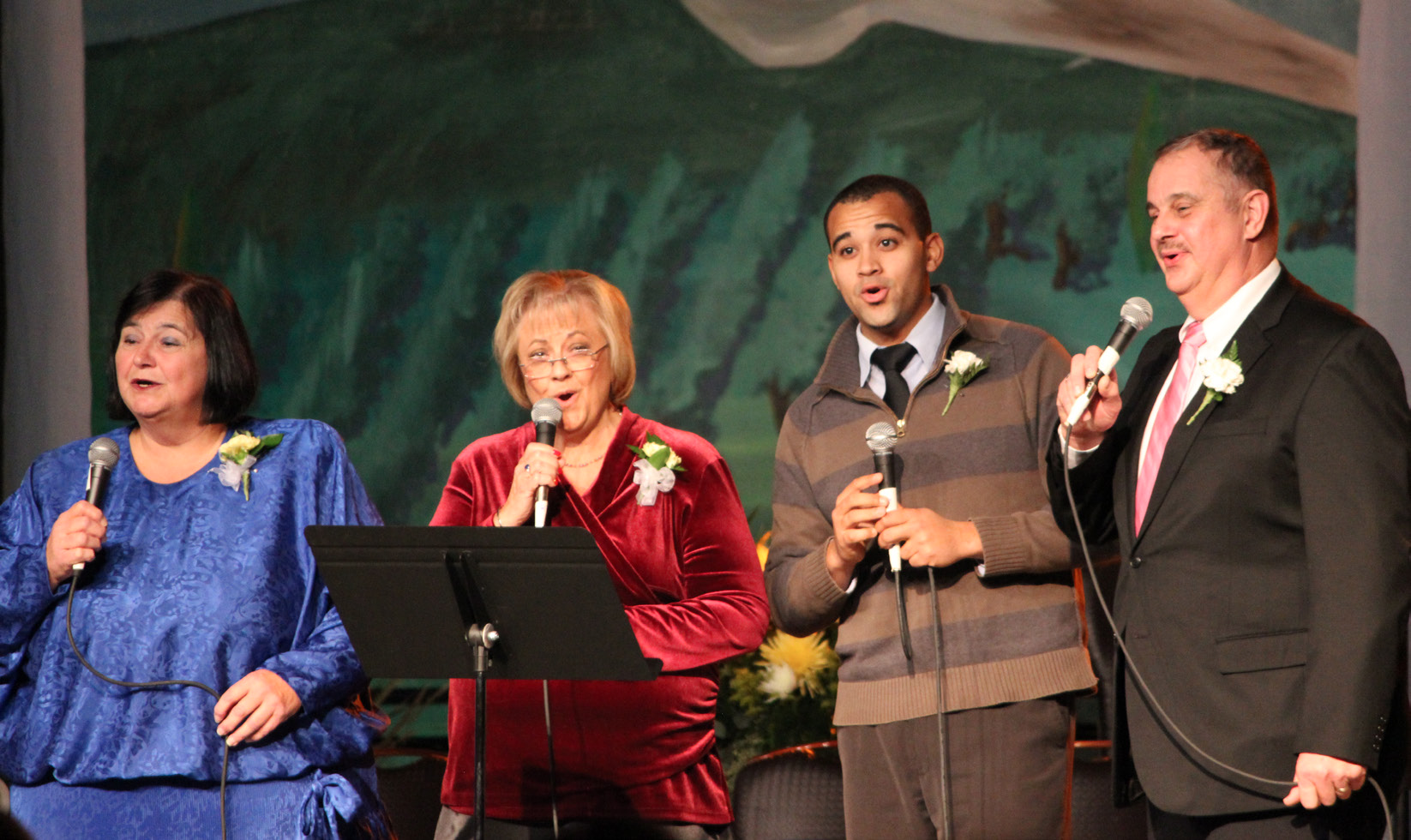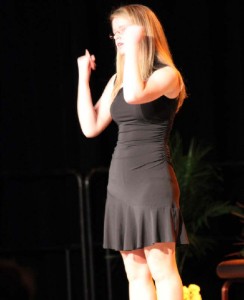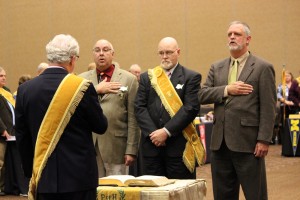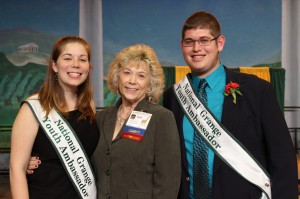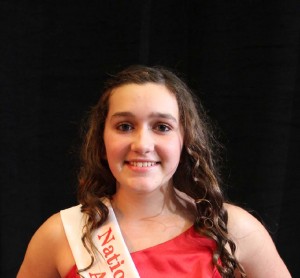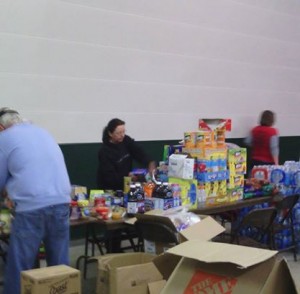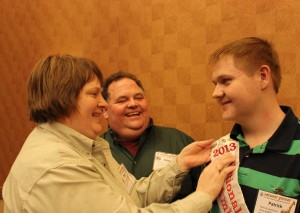Day 6: National Grange 148th Annual Convention
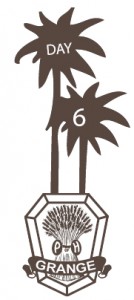 |
 |
Grange talent delights
|
| BY LINDSAY SCHROEDER DCI Communications Fellow | lr*********@*im.com
It was a night to remember with vocal acts, variety acts, and Sign-S-Song performances as well as the announcements of new Junior and Youth Ambassadors. National Grange Lecturer Jim Tetreault co-hosted the event with Illinois State Grange Lecturer Trisha Renken and Michigan State Grange Lecturer Sharon Poplar. He said the Evening of Excellence was “a spectacular showcase of talent and passion in the Grange.”
National Grange Youth Development Director Charlene Espenshade led a portion of the program in which she introduced 11 youth ambassadors from seven different states. “These young people are an incredible asset to their communities and our organizations,” Espenshade said. “I was impressed and amazed at some of the projects they have been part of or spearheaded…” Highlights of the Event included musical acts, skits, Sign-A-Songs and speeches. National Grange Junior Development Director Lillian Booth announced Morgan Browning of Washington as the 2014-15 Junior Ambassador. |
National plans new cookbook |
| BY DEBBIE GEGARE DCI Communications Fellow | de*******@***oo.comDo you like to cook? Need a great recipe? Then you’ll be excited about the next venture for the National Grange headed by Sales, Programs, Benefits and Membership Recognition Director Samantha Johnson. The Executive Committee has approved the production of a new National Grange cookbook. “We are hoping that community Granges will not just purchase them, but share it with everyone,” Johnson said. “Don’t just keep it in your Grange. Share it at farmer’s markets, local bookstores, libraries, community centers. It won’t just be for Grange members.” The cookbook is just at the beginning stages of development. Johnson plans to meet with people after the first of the year to begin working on it. “We are not sure what the cookbook will focus on yet, but hope that it will be ready for Grangers by next year’s convention in Lincoln, Nebraska.” Johnson said. |
New Executive Committee members installed
|
| BY CHRISTOPHER R. SZKUTAK DCI Policy & Communications Fellow | cr******@***il.com
“In installing you as a member of the Executive Committee for the Constitutional term, we remind you, and your associates that your office carries important duties and grave responsibilities,” High Priest Bruce Croucher said. “As an Executive Committee, you are responsible for the custody of the invested funds of the Grange, and from you is expected such advice and counsel as will encourage your fellow officers in the faithful discharge of their duties said Worthy High Priest Croucher ss an Executive Committee, but also and only in conjunction with the Worthy Master, you are authorized, between regular meetings of your Grange, in times of emergency or need, to act for and in the name of the Grange itself.” This charge should look familiar to any member who has witnessed the installation ceremony performed at their local Grange. It is the same wording that is used at all levels of the Grange. But what does that statement mean? When broken down, it tells the newly elected member that their position is one with significant responsibility within the Grange. The primary job of the Executive Committee is to be an advisory board for the Grange and to assist officers in performing their duties adequately. The committee has fiduciary responsibility for the Grange, making sure that the funds of the Grange are used appropriately. Lastly, and most importantly, the Executive Committee has the authority to act in the name of the Grange when necessary. However, they cannot act alone but, must work with the Worthy Master. Following the installation, National Master Ed Luttrell presented immediate past Executive Committee Chairwoman Betsy Huber with a Past Officers pin and thanked her for her service to the National Grange. |
2 PA. Youth chosen as 2014-15 Ambassadors
|
| BY CHRISTOPHER R. SZKUTAK DCI Policy & Communications Fellow | cr******@***il.com
Two youth who have shown outstanding mentoring abilities as a Horizon Leadership Ambassador are selected to serve as Ambassadors each year. The National Ambassadors will receive membership development training and assist with National Grange-sponsored activities. A selection committee, appointed by the National Youth Development Director Charlene Espenshade, selected the ambassadors. The committee judged the candidates based on ambassadorship with an interview, speaking ability, and a written test of Grange knowledge. Snyder of Boiling Springs, Pa., is a member of Valley Grange #1360. He is the son of James and Susan Synder ,and has two brothers, Tyler and Michael. He is a freshman at Penn State, double majoring in business and economics. He has been a member of the State Grange Youth Committee and is a past State Youth Officer Team member. In his free time, he enjoys playing different sports and spending time with friends and family. Cheddar is the daughter of Robert and Denise Cheddar of Elizabethtown, Pa. She is a member of Elizabethtown Area Grange #2017 and Penn State Grange. At Elizabethtown, she is a member of the executive committee and chairs the “June Is Dairy Month” coloring contest. At the state level, Cassidy has been a member of the State Grange Youth Committee and a past State Youth Committee Officer. She is a senior at Penn State, studying agricultural education. She is also a certified parliamentarian. Last year, Cassidy was a Pfizer Communications Fellow at national session. |
Washington Junior named Ambassador |
| BY SUZY RAMM DCI Communications Fellow | gb*******@******ge.org
Browning recently turned 13 and is a fourth generation Granger. She joined Mossyrock junior Grange in 2005 and is a member of Camp Moorhead Junior Grange #401 and the Washington State Junior Grange. In her essay application for Junior Ambassador, Browning wrote, “I have been a Granger since I was born… I feel like I am very good at mentoring the younger kids.” Browning said she has held almost every office in Junior Grange, entered contests and attended the Washington State Grange Convention. Additionally she served as Pomona for the 2007 National Grange Junior Officer Team. She has earned 19 Junior Grange merit badges, 11 Achievement awards through the youth department and in 2013 passed the Super JG test. Tom Gwin, Director of Camp Moorhead, in his letter of recommendation for Morgan said, “Many of our younger campers look to her as a role model and mentor.” Darell Myers, Master of Mossyrock Grange #355, supported her bid for Ambassador as well, writing, “she is very passionate about her activities, especially when it involves Grange.” National Grange Junior Development Director Lillian Booth said Browning was a fantastic candidate who is likely to serve the program well. “I am looking forward to what she does during her year representing this program,” Booth said. |
2015 Junior Grange program looks to future |
| BY SUZY RAMM DCI Communications Fellow | gb*******@******ge.org
This week, National Grange Junior Development Director Lillian Booth announced the new theme for 2015: “Join Us Now In Our Red Shoes.” Programs are being developed to teach Juniors “how to ask others to join the Grange,” Booth said. Through these programs, Juniors will learn critical thinking skills and as develop confidence and ability in public speaking. Additionally, the programs can be adapted to the needs of the individual States Granges or individuals Grange members whether they are a chartered Junior Grange or 1+ members of a Subordinate Grange. Booth said she believes we must also work to educate and develop Junior leaders. “Junior Grange leaders are the key to the success of the program. To that end, a Junior Leader enrichment event will be rolled out in the spring of 2015, starting in Oregon,” Booth said. She expects to do such training through “hands on, interactive activities for Junior Leaders and potential leaders.” “It will provide direction and skills for those working with our Juniors,” she said. Additionally, the Junior Grange department will be actively looking for sponsors and grants for activities and contests, Booth said she also hopes to partner with other groups who share similar goals. |
Enhance youth voice with vote |
| BY PATRICK WADSWORTH 2011-12 National Youth Ambassador | pw**********@***il.comDuring the G.R.O.W. Club dinner at the 148 National Grange Convention, National Master Ed Luttrell told the youth in attendance, “The organization belongs to you. This is your Grange. Don’t be silent. Don’t let others make decisions for you. Don’t sit idle.”Worthy Master, I couldn’t agree more, and many youth I talk to agree as well.At every level of the Grange, including at National Session, a cornerstone of discussion is growth and getting more youth more invested in the organization.One axiom we all agree to is that youth are the future – of this organization as well as any other.So who better to bring other young members into the Grange and to encourage them to stay than the youth? As it stands, the only youth that participate on the national level are the Youth Ambassadors. Throughout the year, Youth Officers practice drills and parts, then open session on Friday and attend workshops. Some young women serve as ‘trumpet girls’ during the Seventh Degree. Outside of these limited roles, and especially throughout the year, youth across the Grange rarely communicate directly with the National Office about their needs and wants. Programs are often developed by adults from a top-down perspective at the National and State level with an expectation that it will attract and engage youth. But youth have no specific mandate or authority to participate in the decision-making of our Order. We have to adapt to the changing times and understand that the resolutions and decisions that are made today effect the future of this organization, just as Master Ed Luttrell said. This is something we should seek to change in order to strengthen the Grange and add a breath of new life. Who is more knowledgeable about what their peers want and what would make us shy away then our Youth? I believe it would be beneficial to the Grange as a whole if we gave a youth member a voice and a look into the decision-making processes that goes on throughout the year. As a youth, I believe the Delegates of the National Grange should consider adding another seat to the Executive Committee, specifically for a young adult. That seat would give a future leader of this organization the opportunity to get a first hand look of how the process works, have a true voice in the process and bring a fresh new perspective to the discussions that affect the future of this organization. This addition would increase the board to seven, allowing the Master the ability to break ties. In even years of the National Session, when there are only two seats up for election, we could add a third for a young adult. The person should be between the ages of 22 and 35 by the day of their election – adhering to the definition of young adult in our youth programming – given the gravity of decisions they are making and consequences related to board membership. There would be no term limits, but this youth member could age out of their seat. A modified preferential election system, similar to that Master Luttrell has experienced in Oregon for state offices, could be put in place with the G. R.O.W. Club membership as the source of nominations for the Young Adults Executive Committee office. Delegates to the National Grange and other members of G.R.O.W. Club in attendance at the National Session on even years would serve as the voting body for this seat. I truly believe as an organization we need to consider this. It would make us stronger, make the youth more passionate and enhance the appeal of existing programs. Worthy Master Luttrell, thank you for reminding us of the importance of the youth voice in the Grange. We look forward to your support of a youth vote. |
Grangers help community after tornado |
| BY KARIE BLASINGAME DCI Communications Fellow | Kb***********@***il.com
More than 5,000 people were in the path of the tornado. Three people died and 125 more were seriously injured. The Hopewell Grange #1747 hall was just outside the path of the tornado. Immediately following the devastation, Illinois Grangers started calling each other to make sure everyone was safe. No Grange members were caught in the storm, but immediately they knew they needed to take action. Two days after the tornado hit, Hopewell Grange began a Facebook page called Hopewell Hugs Washington, knowing that sometimes even just having someone who will listen is help enough. Hopewell Grange opened their hall as a donation and distribution center. They advertised on Facebook that they were taking donations and the donations came pouring in. Grange received supplies and money from Wisconsin, Indiana, Missouri and more states. The Boone County Illinois Fair Queen and her court came with a truckload of donations from fire departments in Northern Illinois. Students and athletes from Perdue University drove donations to the Grange Hall. Elaine Hecathorn, Secretary and Community Service Director of Hopewell Grange said, “People would come from far away and stay and help out for a while.”
“We were able to go into areas others weren’t allowed because we had bottled water and underwear,” Hecathorn said. They were also set up for residents of Washington to come to the Grange Hall and pick up what they needed. They had everything from clothes and food to toys and Christmas gifts for families devastated by the tornado. Having an older hall that takes some money to heat, Master Gary Hecathorn sent out an appeal through the Illinois State Grange that had other Granges in the state clamoring to help. With only 35 members, Hopewell Grange would take items that were donated to them and share them with other shelters and distribution centers throughout the area. Hopewell helped out throughout the initial cleanup efforts and was able to send the last of their donations to other shelters May 1. |
How to become a Youth Ambassador |
| BY KARIE BLASINGAME DCI Communications Fellow | Kb***********@***il.com Each year we watch as Horizon Leadership Ambassadors begin the process of competing to become a National Grange Youth Ambassador. The Youth Ambassador program started several years ago as a way to give assistance to the National Grange Youth Director throughout the year. Youth Ambassadors are chosen at National Grange Session and serve one-year terms. Youth Ambassadors assist the youth director by helping plan a workshop to be given at the regional conferences throughout the country, according to National Grange Youth Development Director Charlene Espenshade. They help with get acquainted games at National Session, assist the youth director throughout the week and emcee youth portions of Friday night’s event. If funds are available, Youth Ambassadors can be sent to other states to represent the National Grange Youth Department. At National Grange Session, each Horizon Leadership Ambassador has a personal interview with the judging panel. This year’s judging panel included National Grange Junior Development Director Lillian Booth, Former National Grange Lecturer and New Jersey Delegate Pete Pompper and Iowa State Grange Youth Director Samantha Hanson. Booth said interviewing the candidates “was a definite opportunity to get to know the youth.” “They are bright, intelligent, artistic, talented,” Booth said. “I was very impressed by how many bridged the gap between juniors and youth. We need that continuity. My hope is they will continue to grow and step into those leadership skills. They have huge potential.” Pompper said the entire group was phenomenal. Hanson observed the youth throughout session and gave her input to the group. Espenshade said the interview process can be challenging. “Going through the interview is a good thing. It gives [the candidates] skills they need in the real world,” Espenshade said. Each year, winners are announced Friday at the Evening of Excellence. |
Getting to know parliamentary procedure |
| BY DEBBIE GEGARE DCI Communications Fellow | de*******@***oo.comMost people are intimidated by the words parliamentary procedure. Just look at any guide book and you will see how complex these rules can be. But if you gain an understanding of their common sense relationships to each other, you will probably feel a little more comfortable speaking at a meeting. The purpose of parliamentary rules of order is to help people make group decisions after a full, fair and free discussion. It’s the rules to help keep things orderly and give everyone a fair chance to be heard by other members of a group. It’s based on parliamentary law, not actual law, but it is the accepted rules and practices that, written or unwritten, we use when we’re assembled and discussing our business. The most basic rules about interacting with others are the basis of what you may hear referred to as the “common parliamentary law.” It’s simply a collection of rules and customs, many of which you use every day, and you know and understand them, even though you never really think about them. PRINCIPLES OF PARLIAMENTARY PROCEDURE • The Rights of the organization supersede the rights of individual members. There are also a few other general principles like the majority rules. Also a minority faction has the right to take all legal measures in order for their position to be adopted by the group, which is usually not wise as it disruptive to the group. And the last one is that it’s harder to change something than to just adopt it in the first place. MOTIONS • A member addresses the presiding officer for recognition. Once this process happens, the group can now discuss or debate the motion. Don’t forget only one person can speak at a time and you must be first recognized by the presiding officer to speak. It’s also good conduct for the presiding officer to alternate between those favoring a motion and those opposing. Preference should first be given to the person who proposed the motion. Then to a member who has not spoken yet to the motion or one who seldom speaks to the group. Any discussion is only on the motion that is “before the house”. When all discussion is finished, the presiding officer takes vote on the motion. You can use many different methods like voice, hands , roll call vote, rising counted vote or balloting. The result is announced and the floor then becomes open for a new motion to be made. AMENDING A MOTION There are three methods to amending a motion. You may add something to the motion that it did not contain. You can strike out something from the original motion. And you can substitute, which is a combination of the first two methods. The substitution portion may consist of a word, a phrase, a clause or an entirely new motion. An important principle to understand in connection with any form of the motion to amend is that an amendment “ MAY BE HOSTILE, BUT IT MUST BE GERMANE.” Hostile is meant opposed to the spirit and aim of the motion to which it is applied. Germane is meant having direct bearing upon the subject of the motion, that is, relevant or relating to it. An amendment may be opposed to the actual intent of the original motion and in fact, nullify it. But if it relates to the same subject matter, it is germane. TYPES OF AMENDMENTS Amendment of the Second Rank: an amendment to the amendment. (The amendment to the amendment must modify and relate directly to the amendment and NOT to the main motion, otherwise it is OUT OF ORDER). NO AMENDMENT BEYOND THAT OF SECOND RANK IS POSSIBLE ORDER OF VOTING UPON AMENDMENTS Discussion is held and the vote taken upon the amendment to the amendment (amendment of second rank). Discussion is called for and the vote is taken upon the amendment to the motion (amendment of first rank). When the vote on this has been taken, discussion upon the original or main motion as amended is opened and when completed a vote is taken upon it. That is just a brief summary of parliamentary procedure to get your going. There are still rights in debate and what’s debatable and what’s not. And whole list of terms and procedures for motions and other actions used in meetings. There are plenty of resources to learn more about parliamentary procedures. |
Dogs for Deaf impresses Grangers
|
| BY KARIE BLASINGAME DCI Communications Fellow | Kb***********@***il.com 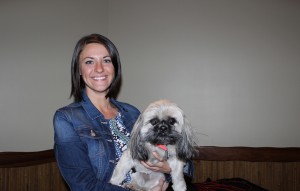 Bonsai, 8, celebrated his attendance at his fifth convention Friday. Bonsai, 8, celebrated his attendance at his fifth convention Friday.
The service dog was on hand for the Idea Fair at the148th Annual National Grange Convention, as part of the demonstration for Dogs for the Deaf, Inc. Jenny Nickelson, Central Point, Ore., who serves as a trainer for the organization had been training dogs for 8 years when she was asked to train a service animal, she told the group gathered for her workshop. Nickelson said she was unsure of how to proceed and chose to search for a way to do it. She found Dogs for the Deaf, Inc., founded in 1977 by Roy G. Kabat, and moved to Oregon to begin her career there. DFD trains dogs to alert for seven different sounds: timer, phone, alarm clock, door knock, smoke alarm and baby cry. The dogs are trained to stop whatever they are doing and alert their owner that there is a sound. Trainers train between five and six dogs at a time for roughly six months. Nickelson said the organization currently has 35 dogs in training. “Only 25 percent of dogs will pass the training and become hearing dogs,” Nickelson told the audience. She said terriers tend to be one of the best breeds to train because “they are tenacious and have a great work ethic.” “Poodles do well. Most of our dogs are mutts, but the herding breeds don’t work as well,” she said. There is a $50 application fee to apply to receive a dog from the program, and if accepted DFD requires a $500 Good Faith donation that is returned, after you have had your hearing dog for one year. It takes roughly a year to receive a dog. Dogs for the Deaf, Inc. does not receive any financial assistance from the government. They accept donations in all sizes and are now offering three different levels of dog sponsorships: quarter sponsorship for $5,000, half sponsorship for $10,000 or full sponsorship for $20,000. “Granges all around the country have really rallied to support Dogs for the Deaf over the past several years,” National Grange Sales, Benefits, Programs and Membership Recognition Director Samantha Johnson said. “In each issue of the Dogs for the Deaf magazine you can see notes of contributions large and small from Granges.” |
Inaugural Grange Parli-Pro contest held Saturday |
| BY CASSIDY CHEDDAR 2013 Pfizer Communications Fellow | cr*******@***il.com On Saturday at the 148th National Grange Convention, two teams of Grangers competed in the first National Grange Youth Parliamentary Procedure Contest. The contest began with a written test about Opening and Closing Ceremonies, Order of Business, and parliamentary procedure in the Grange. Participants also demonstrate their knowledge by conducting a mock meeting. At the conclusion of the performance, they were asked to answer oral questions regarding the meeting. A combination of team and individual scores were used to determine the contest winners. The contest was created to help members learn how to effectively participate in Grange business meetings, National Grange Youth Director Charlene Shupp Espenshade said, “The contest is structured to allow youth to demonstrate competency in the practical aspects of parliamentary procedure. North Carolina State Grange provided funds for the contest and members of the Ohio State University Collegiate FFA volunteered as judges. |
Junior Ambassador had busy year
|
| BY KARIE BLASINGAME DCI Communications Fellow | Kb***********@***il.com
Along with meeting legislators in Ohio and the nation’s capital as part of the National Grange Fly-In, Lanstrum, a 10-year Ohio State Junior Grange member and son of Brian and Chris Lanstrum, participated in many local events promoting Junior Grange. In April, the Parkman, Ohio, native traveled to Washington, D.C. for the Eastern Regional Youth Conference and National Grange Fly-In, at which he met with the chief of staff, Chris Cooper, for his state Representative. Lanstrum went on a private tour of the Capitol and was able to talk to Cooper about school funding for local schools. “Meeting with the assistant helped me learn more about how our national government works,” Lanstrum said. He was also a dignitary at Geauga County Maple Festival parade and served as a Junior Fair Board member of the Geauga County Fair. Lanstrum also participated in the Ohio State Fair promoting Junior Grange in the State Fair parade. During the year, he also participated in some of the most popular Junior Grange events, such as presenting a Sign-A-Song, vocal and instrumental performance at both the Ohio State Fair and his local Geauga County Fair, as well as a Sign-A-Song at the regional conference. At that event he also presented a speech about the history of the National Junior Grange as it celebrated its 125th anniversary. There he gained confidence and used that to guide him through a presentation at the Ohio State Grange Junior Camp. The speech “helped rally the Junior members,” Lanstrum said. Lanstrum said he has enjoyed his experience as a Junior Grange member, but is “looking forward to becoming a subordinate member and will be joining as a member at the next meeting.” “I’m nervous because subordinate Grange has more levels than Junior Grange, Junior Grange only has one level,” Lanstrum said. Chris said the experience has been a very positive one for her son. “Being the National Grange Junior Ambassador has been helpful to him by making him be more responsible, organized and making him a better public speaker,” Chris Lanstrum said. Brian said the year has also been good for his son. “We are very proud of Patrick in what he has achieved in the ambassador program; it has brought him out of his shell,” Brain Lanstrum said. |
Agriculture in 2014: How to get involved in agriculture i your community
|
| BY CHRISTOPHER R. SZKUTAK DCI Policy & Communications Fellow | cr******@***il.com
People today are interested in knowing where their food comes from and local food. These are clear ways that the Grange can involve itself in the community. But what can you do? Here are some project ideas: Farmers’ markets: Many Granges throughout the country are organizing farmers’ markets in their community. Not only is this a great opportunity to shows locally grown food and artisans, it highlights your Grange in a positive light. The best place to start when beginning a farmers’ market is to contact your local Board of Health and the state Department of Agriculture to learn about regulations for selling produce and what permits might be needed. Also, it is wise to do research School gardens: School gardens not only help your local schools to have an additional method of energizing curriculum but also give your Grange an opportunity to directly involve itself with students. Work with teachers to have students select the types of plants that would best grow in your garden. School gardens do not need to be expensive. Instead work with local retailers to secure donations of necessary supplies. Seed lending library: Another way to promote agriculture and sustainability is to establish a seed lending library. As the name implies, this can be set up like an actual library where patrons borrow a certain amount of seed and plant it. After harvest, seeds are saved and returned to the library. Not only does this encourage the practice of seed saving but also will help members of your community establish a garden. These are just a sampling of different projects that can be done to establish a greater presence for the Grange in your community. Remember the key to any successful program is adequate publicity. If you do not tell people what you are doing, no one will ever know. Understanding agriculture today requires comprehension of many different factors. However, the more your Grange can do to work for agriculture, the greater the possibility of making growth a reality. As an organization that has worked for agriculture since 1867, the Grange is in a unique position to make a difference in the communities we serve. That is an opportunity that shouldn’t be wasted. |
State Communications Directors support organization
|
| BY LINDSAY SCHROEDER and KARIE BLASINGAME DCI Communications Fellows | lr*********@*im.com | Kb***********@***il.com Throughout the year, local and State Granges do significant work in their communities that often goes unnoticed. In Rhode Island, for more than 20 years, Howard Paster has made sure that doesn’t happen. Paster, the Information Director who has served under several State Masters in that capacity, is a member of Slocum Grange #36, North Kingstown, R.I., and an affiliate member at Exeter Grange #12. His hard work throughout the years has paid off in 2014 with the State Grange named a recipient of the coveted Distinguished Grange award. “It was in part to Howard’s good work publicizing our events at the local level and letting National know about what we are doing here in Rhode Island that helped us qualify,” immediate Past State Master Steve Logan said. “This is such a good organization. I don’t know why more people don’t know about it, so I work to change that by making sure people know what our Granges are doing,” Paster, who also serves as information director for his wife, Carole’s church and TOPS group, said. And Carole also serves on the state Information Committee with him. “I wanted to know what was going on so I wouldn’t have to wait until he came home to give someone an answer,” Carole said. “So now, I can just tell the people when they call.” Paster has seen his efforts get many Granges in Rhode Island into different news outlets. “I love when papers want to follow up with my articles” Paster said. He is one of several State Grange Communication/Information Directors that help their members enjoy fast, accurate and timely distribution of information and the public to learn more about the Grange. Elaine Hecathorn of Illinois serves as part of the National Grange Communication Department’s Advisory Board. She said it’s important for the Grange to remain at the top of the public’s mind both for membership and relevance in their communities. “Publicity for the Grange, in so many different ways, is every Grange’s and Grangers job,” Hecathorn said. She said using technology to promote the Grange is extremely important. |
Consider adding ‘Innovation Leader’ qualities
|
|
BY MICHAEL MARTIN Culture and society seem to be changing all around us. Yet, in the Grange we stay true to generations of tried-and-true conventions. From how we conduct our monthly meetings, to the recipes in our kitchens, many Granges may not have changed much in a long time. In many cases, that includes the style of our leaders. Do we need to adopt some changes to thrive in the present and prepare for the future? From an IBM Training Module, I learned that, “60% of CEOs believe that ‘creativity’ is the most important leadership quality over the next five years.” But how do they cultivate leadership that can drive organizational creativity? And what does that have to do with the Grange? From that same IBM module, they shared that, “Chief Human Resource Officers do not feel their organizations are effective at developing future leaders, or fostering the spirit of collaboration that causes organizational creativity to thrive.” If Fortune 500 corporations are having difficulty identifying contemporary leaders, how does the Grange stand a chance? Today’s non-profit leaders, and that includes our organization, must balance many complex factors and opportunities, especially in the last few years, including: • Difficult economic climate leading to additional stress on families of Grange members. Are our Grange leaders invoking a broad sense of creativity as they lead our Granges? Do they need to? How can the perspectives of a creative leader help address these and other complexity factors? Creative leaders demonstrate – and support – the following behaviors: • Challenge the status quo So, in addition to these behaviors, how do these leaders foster creativity in our organization? They: • Embrace ambiguity: Reach beyond silos within your organization, exemplify breakthrough thinking, and act despite uncertainty. How can the Grange develop the critical capabilities to enhance creativity among our leadership? • In what ways can you explore, reward and integrate diverse and unconventional points of view? The role of the Innovation Leader goes beyond the traditional definition of Leadership. Leadership is establishing a vision and organizing a group of people to achieve a common goal. Whereas, Innovation Leadership is creating the direction and commitment needed to create and implement something that adds value Innovation Leaders… • Foster collaboration across groups Are you ready to be an Innovation Leader? |

